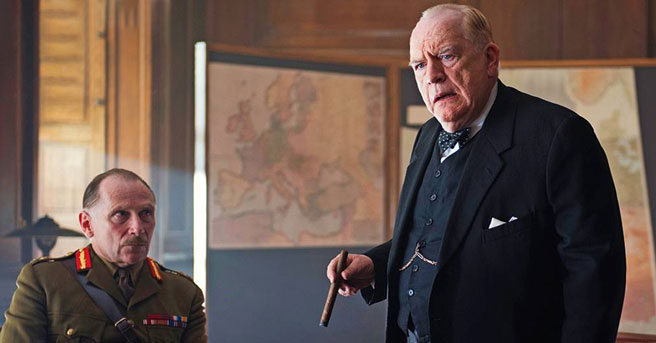
Finest Hour 176
Books, Arts, & Curiosities – Dullest Hours

July 25, 2017
Finest Hour 176, Spring 2017
Page 44
Review by David Freeman
Churchill starring Brian Cox and Miranda Richardson, written by Alex Von Tunzelmann, directed by Jonathan Teplitzky, released by Lionsgate Films: June 2017
Historical dramas require some artistic license. The events of several days, months, or years must be compressed into a viewable timespan. In assessing such films, the reviewer should ask two questions: 1) Does the story remain true to the historical framework? and 2) Does it entertain? Sadly this Churchill fails on both counts.
With regards to accuracy, much can be forgiven up to a point. Lawrence of Arabia, Patton, and The King’s Speech all won the Best Picture Oscar as dramas that entertained while remaining within the essential framework of history. Directors Mel Gibson and Oliver Stone have shown that even when that framework is willfully disregarded, the results can still sometimes make compelling viewing. Alas, Churchill, starring Brian Cox in the title role, commits the greatest of all cinematic sins: it’s boring.
A film about the events leading up to the Normandy invasion in June 1944 should not want for drama, but a low budget, indifferent acting, uninspiring direction, and—above all—a hopelessly insipid script have made it so. It is incredible to think that this is intended to be a theatrical release and not simply a made-for-television movie.

2024 International Churchill Conference
The producers were so anxious to save money that there are only about a dozen speaking parts. None of what is spoken comes from the Churchill canon. Rather than pay a license fee to the estate, the filmmakers opted for phony, pseudo-Churchill speeches. For once we have a film about the D-Day landings that includes no action scenes from the beaches, not even stock newsreel footage. The most aggressive moment on screen comes when an angry Churchill swipes his breakfast off the table.
So dull and dreary is this picture that cataloguing the inaccuracies seems pointless: no one will pay attention long enough to be misled by them. The main storyline imagines that as late as the week leading up to D-Day Churchill was against the whole idea and desperately trying to stop it. Again and again (and again and again) the reason is given as Churchill’s dark memories of the Dardanelles campaign—memories that are not even correct as depicted.
In reality Churchill and the entire British high command worked to dissuade their American counterparts from a premature attempt at a cross-channel invasion in 1942 or 1943. By the spring of 1944 British and American leadership including Churchill were at one in working to make a successful go of Operation Overlord. Yet in the most bizarre scene in the film Churchill, alone in his bedroom on the night before the attack, has a Lear-on-the-heath moment where he gets down on his hands and knees and prays out loud with bombastic fury for a storm of biblical proportions that will force cancellation of the invasion.
In addition to the major errors, there are many minor mistakes. A uniformed King George VI (James Purefoy) salutes his own driver and then turns around and salutes a gathering of generals, suggesting that no one with so much as one day of military service was available to advise the director about one of the most basic of protocols. More egregiously, General Montgomery (Julian Wadham) repeatedly addresses WSC simply as “Churchill”—not “Prime Minister” or “‘Mr.’ Churchill.” No British general officer, not even Monty at his most difficult, would have so much as thought of committing such an act of lèse majesté.
The only good news is that there is a second theatrical release featuring Churchill due out at the end of this year with Gary Oldman in the lead. We must hope that the present forgettable film does not queer the pitch for what currently available evidence suggests will be a much finer hour.
David Freeman is the editor of Finest Hour.
Subscribe
WANT MORE?
Get the Churchill Bulletin delivered to your inbox once a month.


